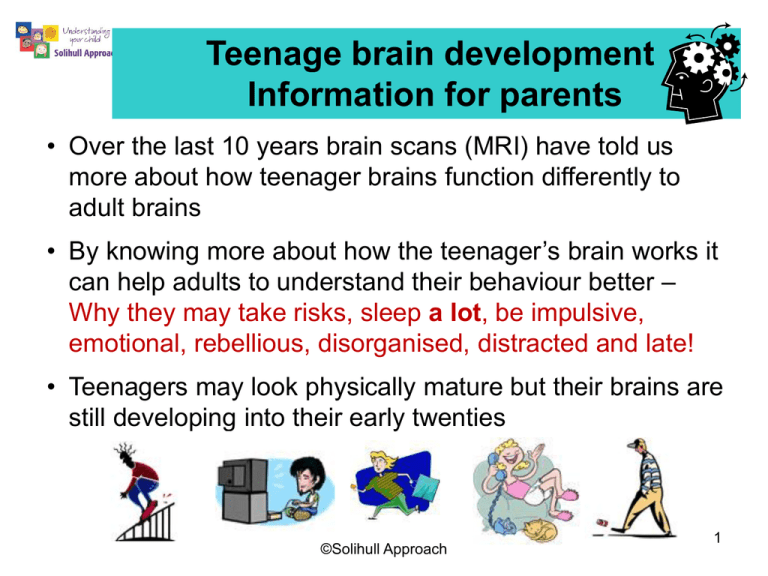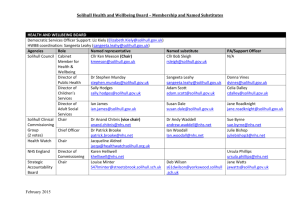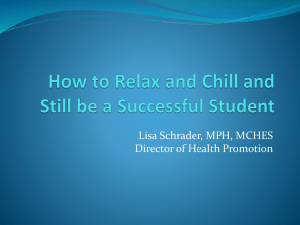Teenage brain development - Solihull Community Services
advertisement

Teenage brain development Information for parents • Over the last 10 years brain scans (MRI) have told us more about how teenager brains function differently to adult brains • By knowing more about how the teenager’s brain works it can help adults to understand their behaviour better – Why they may take risks, sleep a lot, be impulsive, emotional, rebellious, disorganised, distracted and late! • Teenagers may look physically mature but their brains are still developing into their early twenties ©Solihull Approach 1 Teenage brain development Sleep - Information for parents ©Solihull Approach 2 Teenage brain development – sleepTeenage informationSleep for parents Teenagers need at least 9 hrs sleep to be optimally alert Changes in sleep patterns are linked to puberty and changes in hormones girls about 11 years boys around 14years Puberty is a time when teenager’s physical growth speeds up and this is controlled by the release of growth hormone ©Solihull Approach 3 Teenagers’ sleep patterns Teenage Sleep Teenagers are growing very quickly in a short time ©Solihull Approach 4 Teenagers’ sleep patterns Teenage Sleep To grow this quickly they need to make more growth hormone in their body Growth hormone is released during sleep ©Solihull Approach 5 Teenagers’ sleep patterns Teenage Sleep In teenagers the sleep hormone (melatonin) is released about 1am compared to 10pm in adults Teenagers will continue with this sleep pattern until they have finished puberty Near the end of puberty they will change to an adult pattern For girls this is about 19.5 years of age and boys around 21 years of age ©Solihull Approach 6 Supporting your Teenager Teenage Tips for parents Sleep • Bedtime routines and having ways to settle off to sleep are still important. You might just need to adapt them to be more in tune with what is happening to your teenager’s body • Try to encourage a regular bed time that is not too early • Try to keep calm – Just as when they were younger they will rely on you to help them stay calm • Keep bedroom cool • Encourage a calm down time such as agreeing a time to stop using the computer and TV. • Reduce lighting - Having dimmable/lamp lighting can be helpful 7 ©Solihull Approach Teenage brain development Teenage InformationSleep for parents • As adults we use the frontal part of our brain to think, make judgements, organise ourselves and interpret facial expressions and emotions • By using brain scans(MRI) researchers have found that while the front part of the teenager’s brain is growing and developing they use this part of their brain less for some functions ©Solihull Approach 8 Teenage brain development Teenage InformationSleep for parents In teenagers control of speech and interpreting facial expressions and emotions is controlled by the part of the brain we use when we are in danger ©Solihull Approach 9 Teenage brain development Information for parents So can teenagers tell what you are feeling by the look on your face? ©Solihull Approach 10 Teenage brain development Information for parents • An experiment to see if teenagers and adults recognised an expression in the same way • Asked what is this person feeling ©Solihull Approach 11 Teenage brain development Information for parents 100% of Adults were correct They said FEAR correctly 50% of Teenagers were correct The other 50% of teenagers said another emotion, such as anger, shock, sadness, confusion Some said they didn't know It was surprising that even fairly sophisticated teenagers got it wrong Teenagers use the emotional/gut part of the brain more often ©Solihull Approach 12 Teenage brain development Information for parents What might this mean: • When teenagers look at a person’s face to work out what they are feeling they may misinterpret the emotion and consequently the other person’s intention • The teenager’s brain is relying on the gut/emotional/reactive part of their brain rather than the thinking part of the brain, to work out what to do ©Solihull Approach 13 Teenage brain development Information for parents What might this mean: • This might lead to a more impulsive behaviour rather than a thoughtful, controlled one • If this is the case the teenager’s behaviour may not match what the other person was trying to communicate ©Solihull Approach 14 Teenage brain development Teenage InformationSleep for parents • Check out that what you think you have communicated to your teenager is actually what they have understood from you • If you think they haven’t understood, help them out by saying how you feel simply, as well as showing it by your facial expression • Notice when they are feeling stressed or worried and let them know you have noticed ©Solihull Approach 15 Teenage brain development InformationSleep for parents Teenage • Use what you know about your teenager to help them calm down. Sometimes, just as when they were younger, they might need longer to calm down • And help them to make up when things go wrong • Teenagers are still learning about emotions and relationships and still need your help ©Solihull Approach 16 Teenage brain development Teenage Sleep • There are positive aspects of teenage brain development • Their brains are growing rapidly and have enormous potential • They are more open to ideas, amenable to change and less set in their ways ©Solihull Approach 17 Teenage brain development Teenage Sleep • With support and understanding from parents and other adults during their teenage years: Their brains will mature and eventually function as that of a responsible adult They will be more able to organise and plan Their sleep pattern will change and they will get up for work And finally, they will hopefully... ©Solihull Approach 18 We wish!........ Tidy their bedroom ©Solihull Approach 19








